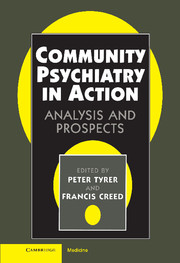Book contents
- Frontmatter
- Contents
- List of contributors
- 1 Essential issues in community psychiatry
- 2 Evaluation of community treatments for acute psychiatric illness
- 3 Synopsis of the Daily Living Programme for the seriously mentally ill: a controlled comparison of home and hospital based care
- 4 Evaluation of a complete community service
- 5 Early intervention study of psychiatric emergencies
- 6 Evaluation of psychiatric services: the merits of regular review
- 7 A home based assessment study
- 8 Home treatment as an alternative to acute psychiatric inpatient admission: a discussion
- 9 The toxicity of community care
- 10 Community mental health services: towards an understanding of cost-effectiveness
- 11 Future research strategies
- Index
5 - Early intervention study of psychiatric emergencies
Published online by Cambridge University Press: 06 July 2010
- Frontmatter
- Contents
- List of contributors
- 1 Essential issues in community psychiatry
- 2 Evaluation of community treatments for acute psychiatric illness
- 3 Synopsis of the Daily Living Programme for the seriously mentally ill: a controlled comparison of home and hospital based care
- 4 Evaluation of a complete community service
- 5 Early intervention study of psychiatric emergencies
- 6 Evaluation of psychiatric services: the merits of regular review
- 7 A home based assessment study
- 8 Home treatment as an alternative to acute psychiatric inpatient admission: a discussion
- 9 The toxicity of community care
- 10 Community mental health services: towards an understanding of cost-effectiveness
- 11 Future research strategies
- Index
Summary
Introduction
Although the randomised controlled trial is still the best available method of comparing different service strategies as well as its more conventional role in the evaluation of treatment, there are many problems preventing generalisation from the findings. To some extent it is always artificial to compare ‘hospital’ and ‘community’ services because in practice all hospital services have some community elements and few community services, if they are truly comprehensive, have no hospital components. Another important methodological problem is that from the initial pioneering studies of Stein & Test (1980) onwards, most of the community services being tested have been set up as a consequence of a research programme and can therefore in no way be regarded as part of a standard service. The findings of such studies, although of great interest, may have no bearing on services in other parts of the country where similar resources are not available. Research teams who are highly motivated, often spurred as much by the academic questions associated with their research as in commitment to their day to day service, are in no way representative of services as a whole.
The issue of burn-out, which has often been attributed to community teams (Dedman, 1993), also cannot be addressed adequately in studies that involve teams that have been especially introduced for the purposes of the research. If teams with a special interest in research are involved in setting up a service it is not surprising if their members move on when the initial flush of research activity ceases. This is not necessarily burn-out but clearly it is inappropriate for a team with a primary clinical function to have repeated changes in membership and direction.
- Type
- Chapter
- Information
- Community Psychiatry in ActionAnalysis and Prospects, pp. 55 - 64Publisher: Cambridge University PressPrint publication year: 1995
- 1
- Cited by



